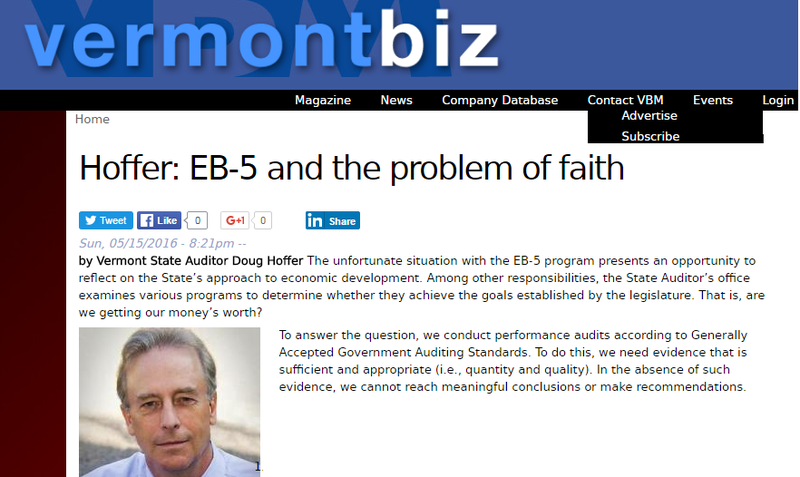The unfortunate situation with the EB-5 program presents an opportunity to reflect on the State’s approach to economic development. Among other responsibilities, the State Auditor’s office examines various programs to determine whether they achieve the goals established by the legislature. That is, are we getting our money’s worth?
To answer the question, we conduct performance audits according to Generally Accepted Government Auditing Standards. To do this, we need evidence that is sufficient and appropriate (i.e., quantity and quality). In the absence of such evidence, we cannot reach meaningful conclusions or make recommendations.
Unfortunately, some economic development programs present serious challenges. Here are some examples.
By statute, the Vermont Training Program may only award grants for training that is supplemental rather than replacement. That is, taxpayers should not pay for training that would have occurred anyway. For example, if a company routinely trains new hires, it would be difficult to justify a training grant intended for new employees. Although applicants are asked about the nature of the proposed training, their statements are not validated. Therefore, we cannot determine the program’s effectiveness because there is no evidence that the grants are only for supplemental training.
The primary performance measure of the Department of Tourism & Marketing (T&M) is the annual increase in rooms and meals tax revenues. This assumes that growth in revenue is due to T&M spending. However, the legislature’s economist reported in 2015 that “current taxpayer-financed advertising expenditures for the tourism sector are estimated to represent a mere 3% of total industry advertising expenditures.” Thus, it is impossible to evaluate the impact of state spending when it represents such a tiny percentage of the total.
The statute that created the Enterprise Fund (e.g., $1 million to Global Foundries) required the administration to submit a memo to the Emergency Board making the case for the award. Among other things, the Board was supposed to consider whether the information presented was sufficient for the State Auditor to conduct a performance audit. I reviewed those confidential memos and the answer was no. As a result, we cannot audit the impact of the grants.
The Vermont Employment Growth Incentive (VEGI) is predicated on a statement from applicants that “but for” the incentive, the promised jobs and capital investment would not occur, or would occur in a significantly different and less desirable manner. However, such statements are subjective and cannot be audited. Therefore, it is impossible to know whether some of the economic activity would have occurred without the program. That means that claims about the program’s impact cannot be verified.
The EB-5 situation highlighted another area of concern with some economic development programs; namely, the inherent conflict of interest between promotion and regulation. Bureaucrats charged with promoting development are unlikely to be unbiased in their oversight of those viewed as “partners.” In addition to EB-5, we see this in the decades-long relationship between the state and the ski areas that lease public lands.
Clearly, the state has an important role to play in creating and enhancing conditions for job creation. As the legislature and the new governor consider their options as to how best to allocate scarce resources, I hope they will insist that all programs are designed to provide the evidence necessary to measure their effectiveness. Without that critical information, how can Vermonters know whether we are getting a fair return on our investment? If we can’t measure a program’s performance, we’re left with faith, which I can’t audit.
http://www.vermontbiz.com/news/may/hoffer-eb-5-and-problem-faith
Mentions
States
- Vermont
Videos





Subscribe for News
Site Digest
Join Professionals on EB5Projects.com →
Securities Disclaimer
This website is for informational purposes only and does not constitute an offer or solicitation to sell shares or securities. Any such offer or solicitation will be made only by means of an investment's confidential Offering Memorandum and in accordance with the terms of all applicable securities and other laws. This website does not constitute or form part of, and should not be construed as, any offer for sale or subscription of, or any invitation to offer to buy or subscribe for, any securities, nor should it or any part of it form the basis of, or be relied on in any connection with, any contract or commitment whatsoever. EB5Projects.com LLC and its affiliates expressly disclaim any and all responsibility for any direct or consequential loss or damage of any kind whatsoever arising directly or indirectly from: (i) reliance on any information contained in the website, (ii) any error, omission or inaccuracy in any such information or (iii) any action resulting therefrom.



